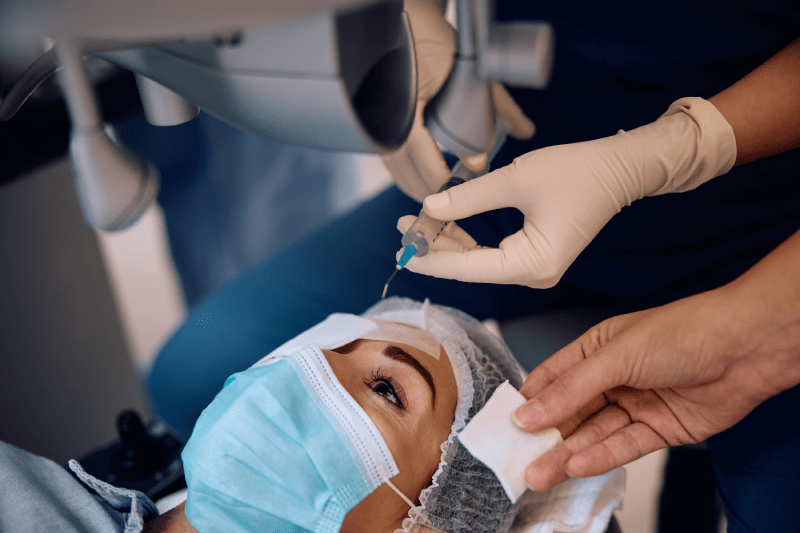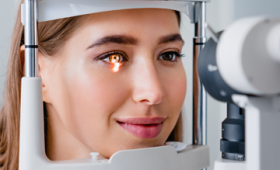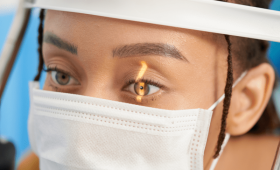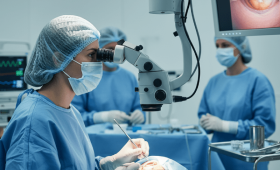How Is The Best Treatment Option For Myopia Determined?
The “best” treatment option for myopia is determined by a specialist physician based on the patient’s eye prescription, corneal thickness, age, and lifestyle expectations. ICL (Implantable Collamer Lens) is recommended for high prescriptions or thin corneas, while laser methods like Femto-LASIK are the most commonly used and successful solutions for low/moderate prescriptions. The choice between laser or lens is based on detailed preliminary examination and corneal map (topography) results. Expert physicians in Turkey guide the patient to the most suitable method for the safest and most permanent result.
Why Is LASIK Treatment The Most Preferred Method For Myopia?
LASIK (Laser-Assisted In Situ Keratomileusis) is the most preferred method for myopia because it yields fast results, is painless, and has a very short recovery time. In modern versions like Femto-LASIK, the cornea is permanently reshaped, allowing the patient to achieve glasses-free clear vision, typically the next day. The fast recovery and high success rate offered by LASIK have made it the number one choice for myopia treatment. However, this method is suitable for patients with sufficiently thick corneas.
Which Myopia Patients Is Intraocular Lens (ICL) Treatment Best For?
ICL (Implantable Collamer Lens) treatment is the best solution for patients whose cornea is too thin for laser or whose myopia prescription exceeds safe laser limits (e.g., above -10.00). With ICL, a permanent lens is implanted inside the eye without touching the patient’s natural lens. This method provides high-quality vision even in situations where LASIK is risky because it does not remove corneal tissue, making it the primary choice for patients with high prescriptions.
What Is The Superiority Of Femto-LASIK Over Traditional LASIK?
Femto-LASIK (bladeless laser) is much superior to traditional LASIK because the stage of creating the corneal flap is performed with a high-precision Femtosecond laser instead of a mechanical blade. This ensures the flap is smoother, thinner, and safer. This technological precision significantly reduces the risk of dry eyes and flap complications. Modern eye centers in Istanbul and Ankara apply Femto-LASIK as standard for patient safety and comfort.
In Which Cases Is PRK Treatment Considered Safer Than LASIK?
PRK (Photorefractive Keratectomy) treatment is considered safer than LASIK for patients whose cornea is too thin for LASIK or whose profession carries a risk of eye impact. With PRK, no flap is created; the laser is applied directly to the corneal surface. This approach less disrupts the biomechanical structure of the cornea, but the recovery period is longer and more pain may be felt in the first days compared to LASIK. Specialists recommend PRK in situations where safety is the priority.
Is Laser Treatment A Permanent Solution For Presbyopia (Near Vision Difficulty)?
Laser treatment permanently corrects only refractive errors such as myopia, hyperopia, and astigmatism. Presbyopia (near vision difficulty after age 40) is a natural aging process resulting from the loss of flexibility of the eye’s natural lens. Laser alone does not provide a permanent solution for this. However, alternative solutions such as the Monovision LASIK technique (one eye set for distance, the other for near) or Trifocal/EDOF lens treatment may be offered to patients over 40.
Which Treatment Is Recommended For High Myopia (Example: Over -10 Diopters)?
The safest and most successful treatment option for patients with high myopia is generally ICL (Implantable Collamer Lens) implantation. Since LASIK requires removing too much tissue from the cornea to correct high prescriptions, the cornea may weaken, creating a risky situation. ICL preserves corneal integrity by placing a permanent lens inside the eye and provides excellent, high-resolution vision. Expert centers in Istanbul successfully apply this advanced surgical method.
What Is The Risk Of Myopia Recurrence (Regression) After LASIK Surgery?
The risk of myopia recurrence (regression) after LASIK surgery is very low in patients whose eye prescription was stable for at least one year before the surgery. Regression usually occurs in young patients whose prescription was still changing or in situations where very high prescriptions were corrected. If a small prescription remains, reliable clinics generally offer a free Touch-Up (enhancement) laser intervention within one year.
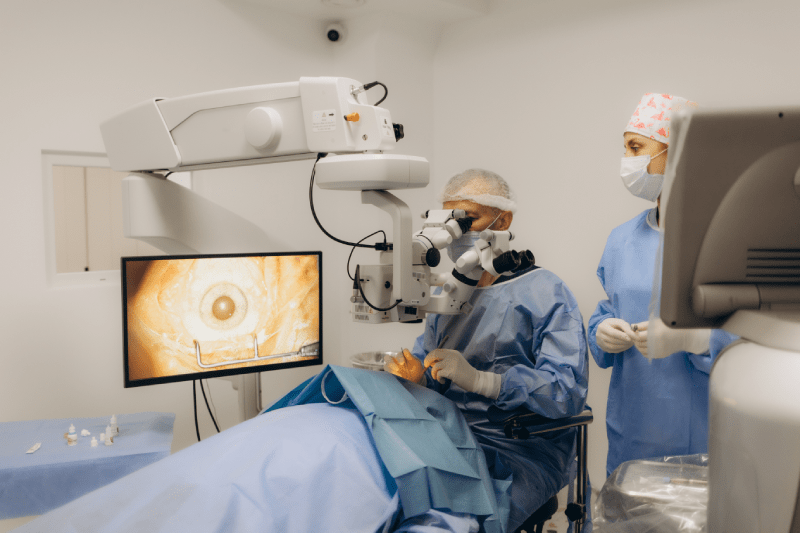
Which Factors Make Myopia Treatment Prices Attractive In Turkey?
Factors that make myopia treatment prices attractive in Turkey include: a cost advantage of up to 50-70%, a significant exchange rate difference, low operational costs, and investment in state-of-the-art devices like Femto-LASIK. These procedures, performed with the same quality laser devices and expert surgeons as in Europe, can be completed with a budget far below European prices. Through Cure Holiday, you can find suitable packages that include accommodation and transfers and decide to receive treatment in Turkey.
Why Is Corneal Thickness Measurement Critical Before Treatment?
Corneal thickness measurement (Pachymetry) is critically important for laser surgery (LASIK). Since the laser reshapes the cornea, the remaining corneal tissue must not fall below a certain thickness. Applying LASIK to patients with insufficient corneal thickness increases the risk of keratoconus (corneal structural distortion). Therefore, specialist physicians perform detailed pachymetry and corneal map (topography) tests before surgery to guarantee the patient’s safety.
What Is The Average Cost Of LASIK Surgery In Turkey?
The average cost of Femto-LASIK laser surgery in Turkey is one-third to one-half the price of equivalent clinics in Europe. Prices vary according to the use of Femto-LASIK or more advanced Wavefront technology, the quality of the consumables used, and the scope of the package offered by the clinic (VIP transfer, accommodation). However, this cost is highly suitable even for operations performed at international standards by expert physicians. You can get transparent price quotes through Cure Holiday and easily manage your budget.
Are Accommodation And Transfer Included In Laser Surgery Packages?
Clinics and organizations like Cure Holiday focused on health tourism generally offer comprehensive packages for the comfort of international patients. These packages may include VIP airport transfers and short-term accommodation in 4 or 5-star hotels during the treatment period, in addition to the surgery cost. These services ensure that the patient does not experience logistical stress in Istanbul or other major cities, allowing them to focus solely on rest and treatment.
Do High Eye Prescriptions Increase The Price Of Laser Treatment?
Laser treatment prices are generally determined by the type of laser applied (Femto-LASIK, PRK), and high eye prescriptions (e.g., over -8.00) do not usually lead to a large price difference. However, if the patient’s cornea is thin and the more expensive ICL (Intraocular Lens) treatment is chosen to enhance safety, the total cost will increase. The physician aims to recommend the safest treatment at the most suitable cost.
Are Detailed Eye Tests Performed Before Laser Treatment Included In The Fee?
Yes, the fees for all detailed tests mandatory before laser surgery, such as corneal thickness, corneal map (topography), eye pressure, and fundus examination, are included in the laser package price offered by reliable clinics. This diagnostic phase is fundamental to surgical planning and patient safety. Patients should confirm that these tests are included in the package when deciding to receive treatment in Turkey.
Are Medications And Drops Included In The Package Price After Surgery?
Yes, all antibiotic and cortisone eye drops and painkillers that must be used during the post-operative recovery period are included in most comprehensive packages. This service eliminates the patient’s need to search for extra medication in Turkey and ensures that the recovery process is supported with the correct products. Regular use of the drops is critically important for preventing infection risk.
What Is The Free Touch-Up (Enhancement) Guarantee If The Laser Fails?
If a small prescription rarely remains after a successful laser surgery, reliable clinics generally offer a free Touch-Up (enhancement) laser intervention guarantee within one year. This guarantee ensures that the remaining error is corrected and the patient achieves full visual clarity. This assurance is an important factor that provides long-term satisfaction to the patient and increases confidence in receiving treatment in Turkey.
Is The Price Of Monovision LASIK Treatment Different From Standard LASIK?
The price of the Monovision LASIK technique is not different from standard LASIK as long as the same laser technology (Femto-LASIK) is used. Monovision is applied by the surgeon planning one eye for distance and the other for near vision. This difference in planning does not change the operating time or the cost of the laser device. Monovision offers an affordable solution for patients over 40 who experience near vision difficulty.
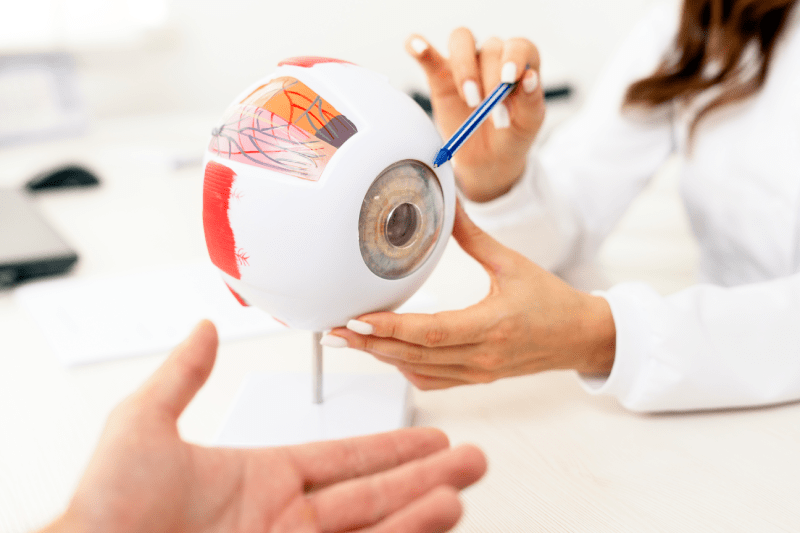
What Are Potential Hidden Extra Costs And How Can They Be Prevented?
Transparent corporate clinics avoid hidden costs. However, extra costs that may rarely arise include: the mandatory fee for switching to ICL lens because the cornea is too thin, extra specialist consultation fees for an uncontrolled chronic disease, or the cost of long-term artificial tear drops. These risks must be determined during detailed pre-operative tests, and the patient must be informed in writing beforehand.
How Is The Most Suitable Budget For Laser Surgery Determined?
The most suitable budget for laser surgery should be determined based on a comprehensive package price that includes not only the surgery but also tests, medications, transfer, and accommodation. Professional institutions like Cure Holiday provide transparent budget options by combining all these costs into a single price. When determining the budget, choosing a package that guarantees advanced technology like Femto-LASIK and expert physician experience instead of the lowest price is the most profitable decision in the long run.
What Is The Cost Of Switching To EDOF Or Trifocal Lens Treatment?
If you are not suitable for LASIK surgery and are over 40, you may need to switch to Trifocal or EDOF lens treatment. The cost of these treatments is significantly higher than LASIK due to the high production cost of the lens. The price varies according to the brand of the lens (Premium) and the necessity of astigmatism correction (Toric Lens). However, even this remains far below Western prices due to Turkey’s exchange rate advantage.
How Fast Is The Recovery After Laser Surgery?
Recovery after laser surgery is incredibly fast, especially for patients who undergo Femto-LASIK. Patients generally begin to see clearly the next day at the first check-up and can return to their daily activities. Achieving full and final visual acuity may take a few weeks to a month. This rapid recovery process allows patients to quickly utilize their short stay in Turkey and return to their work.
How Long Must Contact Lens Use Be Stopped Before Surgery?
Contact lens use must be stopped before surgery to allow the cornea to return to its natural shape. Soft lens users must stop using them at least 1 week prior, and hard lens users must stop using them 2 to 4 weeks prior. This period is vital for accurate and correct pre-operative measurements.
How Is The Risk Of Blinking Prevented During Laser Surgery?
The risk of blinking during surgery is physically prevented by using a special eyelid holder (speculum). Additionally, modern laser devices are equipped with very fast eye-tracking systems (Eye-Tracker) that either immediately stop the laser or adjust it according to the eye movement, maximizing surgical safety and reducing patient stress.
How Long Does The Dry Eye Problem Last After Surgery?
Temporary dry eyes are an expected side effect after surgery and generally resolve completely within a few months. Femto-LASIK like modern techniques reduce the risk of dryness. Physicians manage this condition by prescribing intensive moisturizing (artificial tear) drops. Performing a dry eye test before surgery helps in selecting the appropriate treatment.
How Does The Experience Of Eye Surgeons Affect Treatment Success?
The success of laser eye surgery heavily depends on the surgeon’s experience and precision. Eye surgeons in Turkey have international levels of practical experience due to the high volume of cases. An experienced surgeon is the greatest assurance that the surgery will be safe, accurate, and the results will be permanent.
When Is Eye Makeup And Lens Use Safe After Surgery?
To prevent infection risk, eye makeup (mascara, eyeliner, shadow) and contact lens use are strictly forbidden for at least 1 week (preferably 2 weeks) after surgery. This period is required for the corneal flap to fully settle and the wound healing to complete. Patients must also strictly avoid rubbing their eyes during this period.
Why Does ICL Lens Offer A Higher Success Rate In High Myopia Treatment?
ICL lens offers a higher success rate and safety than LASIK in high myopia treatment because it does not damage corneal tissue and preserves corneal integrity. ICL corrects high prescriptions while maintaining the cornea’s strength, which maximizes post-operative stability, especially in patients with thin corneas. ICL lens provides excellent visual quality even in high prescriptions.
When Is Air Travel Safe After Surgery?
Since laser eye surgery is a micro-surgical procedure, patients can safely fly immediately after the mandatory first-day check-up (usually 24 hours after the surgery). This allows patients to utilize their short stay in Turkey most efficiently. However, using regular moisturizing drops during the flight is recommended to mitigate the risk of dry eyes.
In Which Cases Is Lens Treatment (ICL/Trifocal) Recommended To Get Rid Of Glasses?
Lens treatment is recommended to get rid of glasses in the following situations: 1) The myopia prescription is too high and corneal thickness is insufficient (ICL), 2) The patient is over 40 years old and has presbyopia/cataract issues (Trifocal/EDOF lens). Laser is not a sufficiently permanent or safe solution in these cases.
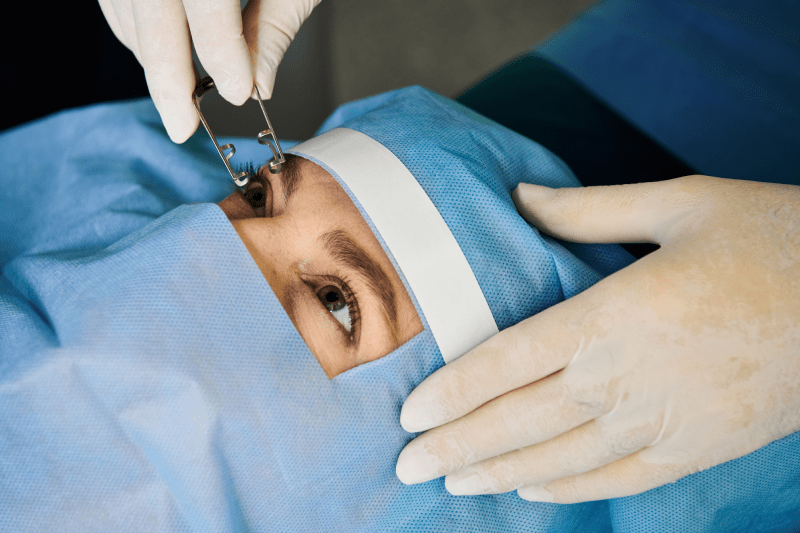
Will Night Vision Problems Occur After Laser Surgery?
Some patients may experience temporary reduced night vision, halos, or glare after LASIK. This condition is generally resolved as the cornea adapts within a few weeks to a few months. Wavefront (i-LASIK) like personalized laser technologies are used in Turkey to minimize this risk and optimize night vision quality.
Which Chronic Diseases Must Be Controlled Before Laser Surgery?
Uncontrolled diabetes, thyroid diseases, and certain chronic conditions must be strictly controlled before laser surgery. Uncontrolled diabetes slows down wound healing and increases the risk of infection. Physicians mandate that the patient’s blood values be within acceptable limits before surgery to maximize the surgery’s safety and success.
Why Should Turkey Be Preferred For Eye Surgery?
Turkey should be preferred for eye surgery due to the combination of expert surgeons’ high experience, the use of latest technology devices like Femto-LASIK, and a cost advantage of up to 50-70% compared to Europe. JCI-accredited hospitals and the logistical comfort provided by organizations like Cure Holiday guarantee a stress-free and high-quality treatment process.
Which Is Better For Laser Surgery: Istanbul Or Antalya?
Both Istanbul and Antalya have high-quality, internationally accredited hospitals. Istanbul offers a wider range of specialist surgeons and higher case volume. Antalya is ideal for those who want to combine high-quality clinic services with holiday comfort. The decision depends on the patient’s personal preference and budget.
How Long Does The Process Of Getting Rid Of Glasses Last After Laser Treatment?
The process of getting rid of glasses after laser treatment is very fast. Patients generally begin to see clearly right after the surgery and stop using glasses completely the next day. The eye’s dependence on glasses for myopia is permanently eliminated. This fast result allows patients to quickly return to their normal lives after their short stay in Turkey.
In Which Cases Is Presbyopia Laser Preferred Over Standard Laser Surgery?
If the patient is over 40 and has started experiencing near vision difficulty (presbyopia), Presbyopia Laser (Monovision) is preferred while correcting myopia to enable the patient to see near as well. This technique adjusts one eye for far and the other slightly for near vision. The physician recommends the most suitable method based on the patient’s lifestyle.
What Is Cure Holiday’s Role And Advantages In The Treatment Process?
Cure Holiday serves as a bridge of trust, quality, and organization for patients. It selects the best accredited eye centers and expert surgeons suitable for the patient’s budget and eye structure. It organizes all logistical processes (VIP transfer, luxury accommodation) and provides uninterrupted interpreter support, guaranteeing a safe, stress-free, and transparent treatment process in Turkey.
How Mandatory Is The Use Of Sunglasses After Surgery?
The use of sunglasses (UV protected) is absolutely mandatory for at least one month after surgery to protect the healing cornea from UV rays. Sunglasses protect against dust and wind, which could lead to complications. Wearing sunglasses and a protective shield at night is vital for the surgery’s success.
How Does The Use Of High Technology (Femto Laser) Increase Surgical Success?
The use of high-technology Femto Laser directly increases surgical success by creating the corneal flap with millimetric precision. This minimizes the risk of flap-related complications (slippage or irregularity), maximizes visual quality, and significantly reduces the risk of dry eyes. This advanced technology is easily accessible in Turkey.
What Is The Average Duration Of Stay Recommended In Turkey For Treatment?
An average of 3 to 4 days of accommodation is recommended in Turkey for myopia laser surgery. This period is sufficient for detailed pre-operative examination, the surgery day, and the mandatory first-day check-up. This short accommodation period ensures that the patient does not have to take a long leave from work.

How Long Does The Prohibition On Sports And Swimming Last In The Recovery Period?
Light exercise and walks can generally be done after 2-3 days. However, heavy sports that carry a risk of impact to the eye and swimming (sea/pool) should be avoided for at least 2 weeks (preferably 1 month). Water and sweat getting into the eye increase the risk of infection.
Is ICL Intraocular Lens Treatment A Permanent Solution After Surgery?
Yes, ICL Intraocular Lens treatment is a permanent solution for a lifetime because the lens is permanently placed inside the eye and is composed of a biocompatible material. This treatment permanently eliminates the need for glasses/lenses for myopia, regardless of the patient’s age.
Are Long-Term Check-Ups Charged After Laser Surgery?
Reliable clinics generally offer post-operative long-term control appointments (6 months/1 year) free of charge for one year. The patient is only obliged to cover the travel expenses (airfare) required for these controls. This free check-up guarantee ensures the patient’s long-term safety.
Which Methods Are Used For Patients With Insufficient Corneal Thickness?
Patients with insufficient corneal thickness (thin cornea) are generally recommended PRK laser (which removes less tissue) or ICL (Intraocular Lens) implantation. ICL lens is the safest and most effective solution as it preserves corneal integrity.
What Is The Most Suitable Age Range For Receiving Treatment In Turkey?
The most suitable age range for myopia laser surgery in Turkey is between 20 and 40, where the eye prescription is stable. This age range offers the highest success and permanence rate. Young patients under 18 or those whose prescription is still changing are usually not suitable for surgery.
